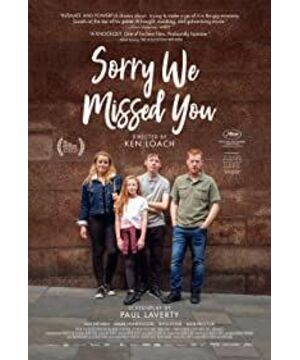Moviegoers used to control themselves before tears, whether by distraction or embarrassment, until last year when I, Daniel Blake's 'I am a man, not a dog' accusation at the end of the film broke down for the first time. The tear-jerking moment in Sorry We Missed You, for me, was the gaffe of Abby, a carer and mother/wife who took care of her "client" like a mother.
Ricky's drowsy driving and nearly accident follow-up shot tells us that Ken Loach doesn't need to deliberately create a melodrama plot, and the strong sense of pressure given to us by the ending/climax/title of the two films also shows that he is not afraid of clear political expression. Maybe that's why it's rare to hear anyone claiming to be a "brain fan" of Ken Loach. It's a heavy label, and it seems hard to touch whether you treat movies as entertainment or art. But even if we don't speak out, it's hard not to pay our respects.
When I heard a few years ago that "Bicycle Thief" didn't even bring stable jobs to a few amateur actors, I was skeptical about the practical significance of the once-favored neorealism. Now I more and more agree with what Mr. Dai Jinhua said, movies make it possible to "see", and in this digital economy where being "seen" by everyone requires a high "exposure cost", these "thousands of people" live in In the fragmented era of the so-called "information cocoon room", there are still such artists and art media who are willing and able to let us see "abandoned people" who are excluded from the system and even have no value for hunting, let us watch the usual blindness , thus awakening to the realization that we are just as human as they are. That's probably the point of a realist movie.
View more about Sorry We Missed You reviews











